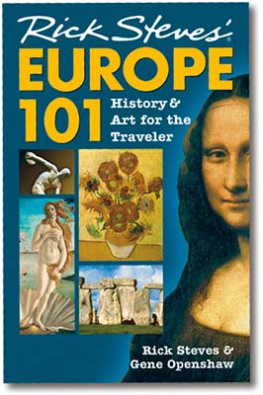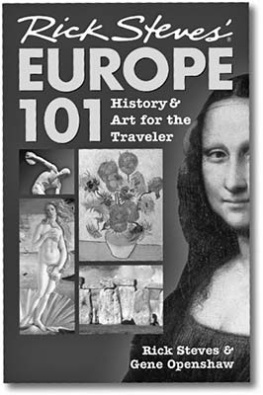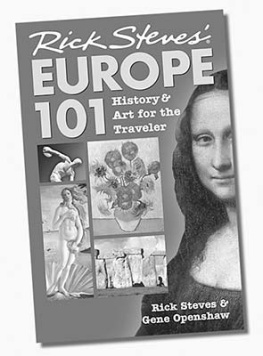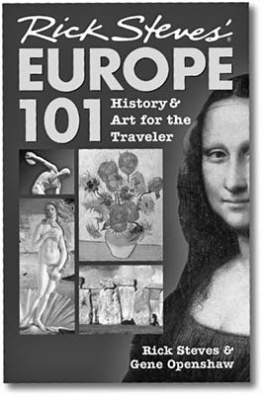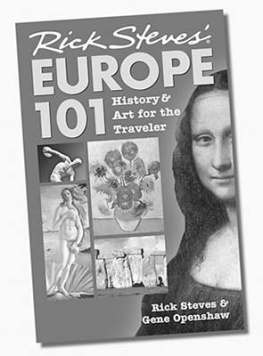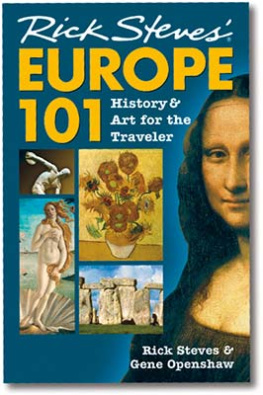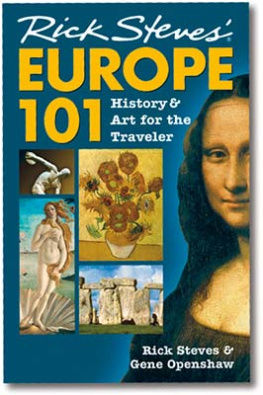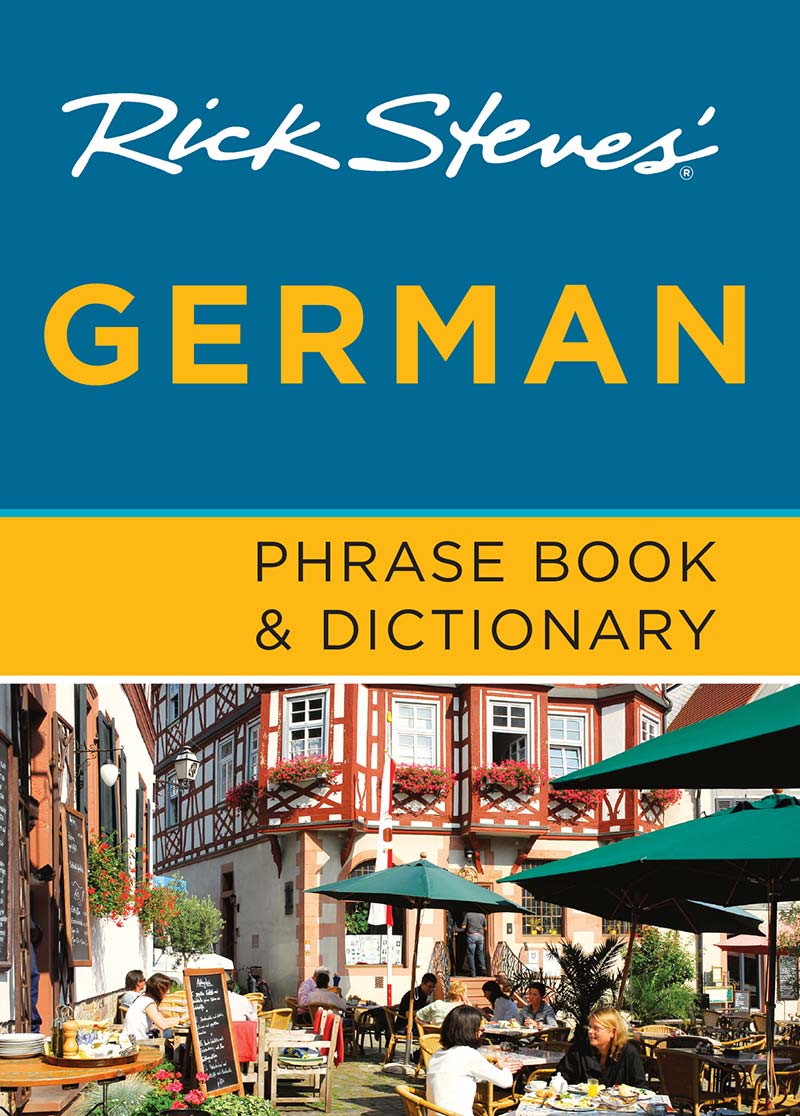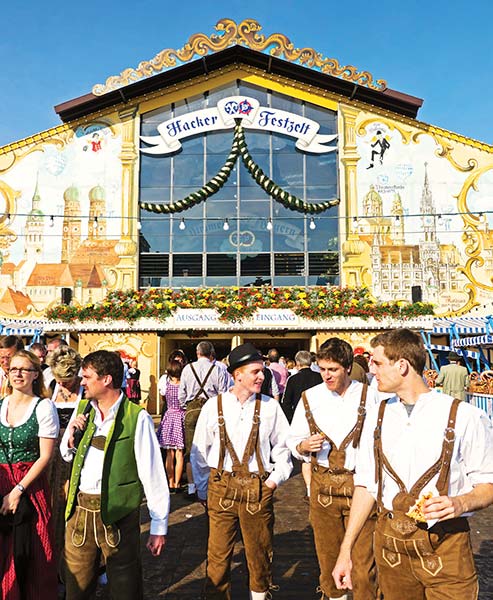Contents
Contents
Rick Steves'
GERMAN
PHRASE BOOK & DICTIONARY
Hi, Im Rick Steves. Im the only monolingual speaker I know whos had the nerve to design a series of European phrase books. But thats one of the things that makes them better. You see, after more than 30 years of travel through Europe, Ive learned firsthand: (1) whats essential for communication in another country and (2) whats not. Ive assembled these most important words and phrases in a logical, no-frills format, and Ive worked with native Europeans and seasoned travelers to give you the simplest, clearest translations possible. But this book is more than just a pocket translator.
The words and phrases have been carefully selected to help you have a smarter, smoother trip. The key to getting more out of every travel dollar is to get closer to the local people, and to rely less on entertainment, restaurants, and hotels that cater only to foreign tourists. This book will give you the linguistic four-wheel drive to navigate through German, Austrian, and Swiss culturefrom ordering a meal at a locals-only Tirolean restaurant to discussing travel dreams and your best and wurst memories with the family that runs the place. Long after your memories of castles and museums have faded, youll still treasure the close encounters you had with your new European friends. While Ive provided plenty of phrases, youll find it just as effective to use only a word or two to convey your meaning, and rely on context, gestures, and smiles to help you out. To make harried postal clerks happy, dont say haltingly in German: I would like to buy three stamps to mail these postcards to the United States.
All you really need is Briefmarken (stamps), USA (pronounced oo-ehs-ah), and bitte (please). Smile, point to the postcards, hold up three fingers...and youve got stamps. (For more advice, see Tips for Hurdling the Language Barrier .) While a number of Germans (and Austrians and Swiss) speak fine English, some dont. The language barrier can sometimes seem high in German-speaking nations, but locals are happy to give an extra boost to any traveler who makes an effort to tackle the language. To get the most out of this book, take the time to internalize and put into practice my German pronunciation tips. But dont worry about memorizing grammatical rules, like the gender of a nounforget about sex, and communicate! This book has a nifty menu decoder and a handy dictionary.
Youll also find tongue twisters, international words, telephone tips, and two handy cheat sheets. Tear out the sheets and tuck them into your dirndl or lederhosen, so you can easily memorize key phrases during otherwise idle moments. A good phrase book should help you enjoy your travel experiencenot just survive itso Ive added a healthy dose of humor. And as you prepare for your trip, you may want to read the latest editions of my guidebooks: Rick Steves Germany, Rick Steves Switzerland, and Rick Steves Vienna, Salzburg & Tirol. German is the closest thing Ill ever have to a second language. It takes only a few words to feel like Im part of the greater Germanic family, greeting hikers in the Alps, commiserating over the crowds in Rothenburg, prosting in the beerhalls of Munich, and slap-dancing in Tirol. My goal is to help you become a more confident, extroverted traveler.
If this phrase book helps make that happen, or if you have suggestions for making it better, Id love to hear from you at . Gute Reise! Have a good trip!
Versatile, entertaining German is spoken throughout Germany, Austria, and most of Switzerland. In addition, German rivals English as the handiest second language in Scandinavia, the Netherlands, Eastern Europe, and Turkey. German is kind of a Lego language. Be on the lookout for fun combination words. um... uh... uh...
German pronunciation differs from English in some key ways: CH sounds like the guttural CH in Scottish loch. G usually sounds like G in go (rarely like G in giant). J sounds like Y in yes. K is never silent. S can sound like S in sun or Z in zoo. TH sounds like T in top. V usually sounds like F in fun. W sounds like V in volt. Z sounds like TS in hits. AU sounds like OW in cow. U and EU sound like OY in joy. EI and AI sound like I in light. IE sounds like EE in seed. IE sounds like EE in seed.
German has a few unusual signs and sounds. The letter is not a letter B at allits interchangeable with ss. Some of the German vowels are double-dotted with an umlaut. The usually has a sound like E in get. The has a sound uncommon in English. To make the sound, round your lips to say o, but say ee.
To say , pucker your lips to make an oo sound, but say ee. The German ch has a clearing-your-throat sound. Say Achtung! You can communicate a lot with only a few key German phrases. For example, the versatile es gibt and geht das have only two syllables apiece, but they can be useful in many situations. Heres how: Es gibt (which means there is and is pronounced ehs gibt) can be used with any noun to create a statement of fact. If you dont know how to say Its raining, just say Es gibt Regen (There is rain).
And if you reverse the words, it becomes an all-purpose question: Gibt es Toilette? (Is there a toilet?) Geht das? (pronounced gayt dahs) literally means Does this go?basically Is this OK? Its a handy phrase when combined with a gesture. When showing your sightseeing pass to a museum ticket-taker, it means Is this ticket valid at your museum? When pointing to your camera at a market stall, it means May I please take a picture? The answer (you hope) will be Das geht. The globally understood OK? works in many of the same situations. Heres a quick guide to the phonetics in this book:
| ah | like A in father |
| ar | like AR in far |
| ay | like AY in play |
| ee | like EE in seed |
| eh | like E in get |
| ehr | sounds like air |
| ew | pucker your lips and say ee |
| g | like G in go |
| kh | like the guttural CH in Achtung |
| i | like I in hit |


